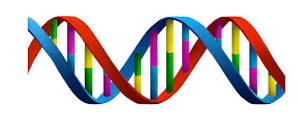
I have been fascinated recently with the intersecting stories of genetics, lifestyle choices, and dementia, and thought I'd share with you some of the information particular to genetics!
Warning: if you don’t believe in the process of evolution and natural selection, you might not enjoy the opening paragraphs. Skip to the second part!
Natural Selection
Hundreds of thousands of years ago our primate ancestors lived an arboreal life. They swung from limb to limb, collecting food from the branches and sleeping in the crooks of giant tree trunks. Their lengthy intestines fermented the fruit and vegetable matter, enabling fermented fatty acids to provide the cholesterol and lipids needed by their immune systems, brains, and nervous system. They ate only fresh food and rotated their sleeping and living sites, avoiding any need for considerations of sanitation.
At some point, some early primates ventured down out of the trees and included meat in their diet: free-range, low-fat meat, and remember they didn’t have refrigerators. Their intestines had shortened, so they needed help absorbing as much fat as possible from their food, no longer able to ferment as well. And sometimes their food wasn’t quite so fresh—they needed more of an inflammatory response so they could survive greater range of bacteria. The ancestors who carried a new gene (200,000 years young), the ApoE4 gene, were best suited to becoming terrestial, as highly inflammatory, high fat absorbers. Our ApoE4 ancestors had what they needed to survive a transition from tree to ground life.
They didn’t live long enough to notice that the ApoE4 gene also conferred an increased risk of dementia and cardiovascular disease.
About 70,000 years ago, a novel form of the gene arose: the ApoE3 gene. The ApoE3 gene is less potent at fat absorption and inflammation, but our ancestors tolerated that well, with a more diverse diet and greater skills at creating sanitary living spaces. The hidden benefit appeared with advanced age, as the ApoE3 carriers had healthier brains and hearts with advanced age. Although natural selection is most concerned with health during reproductive years, it is hypothesized that with early human settlements, familiest with living grandparents fared better. No longer needing the ApoE4 gene, and receiving some benefit from the ApoE3-conferred longevity, ApoE3 carriers thrived.
It turns out now that most of us carry two copies of just the ApoE3 gene. About a quarter of us have the ancestral gene, a copy of ApoE4, and these folks are considered ApoE3/4. A very small (one percent?) are unlucky enough to have two 4’s. People with the ApoE4 gene are at greater risk for cardiovascular disease, and for dementia.
Modern Science
Folks who tend to have high cholesterol and anyone interested might get their ApoE genes checked: it can be done through a routine blood test, but insurance often doesn’t cover it. Some contractual labs (Cleveland Heart Lab, Genova, SpectraCell) have some less expensie ways of finding out the information. 23andMe.com provides ApoE information as part of their routine raw data collection, but a minority (15%) of the samples come back as unread for the ApoE3 genes. The rest of the information is still valid and useful!
If you have one or two copies of the ApoE4 gene, you are at increased risk for dementia and cardiovascular disease. The general risk of Alzheimer's is about one in nine: ApoE3/4 increases your risk up to about one out of three. Two copies raises your risk to about 95%. With the ApoE4 gene, you are overly good at absorbing cholesterol and might have high levels. You also can tend to over-do inflammation, which is an aspect of those two diseases, as well as many others.
Your dietary needs are a bit different from other folks with high cholesterol.
- Much as I think red meat and full-fat dairy are good for most people, they are not good for you. They can be quite inflammatory and create unhealthy profiles of lipid particles.
- Use red meat, dairy and even poultry as an occasional protein source, not a regular one.
- Stick to fatty fish and shellfish and eat a lot of it. Choose wild-sourced seafood and get yourself checked for mercury toxicity through a routine lab test or specialty lab. (I use Genova for that.) If your multi-vitamin doesn’t contain selenium, take 100 mg each time you eat tuna or a not-so-carefully-sourced fish.
- Olive oil and avocado and eggs are still good for you.
- Coconut oil may be inflammatory: if you love it, check yourself on and off of it for levels of inflammation.
- Green and leafy and cruciferous vegetables are great for all of us!
- Grains in general, gluten in particular, can raise levels of inflammation: go without.
- Intermittent fasting is good for you: can you go 12-15 hours a day without eating? Cultivate the ability!
Beyond dietary considerations, pay special attention to the other factors that increase dementia risk and consider following the program described in my dementia articles here and here.
- A history any hormonal challenges (hypothyroid, early menopause, etc.) or history of hormone-sensitive cancers (breast, colon, prostate)
- History of head injury
- Insulin resistance or pre-diabetes
- Sleep disorder of any sort or increased stress
- High levels of homocysteine
The good news is that lifestyle can go a long way to compensate for the genetic challenge of having a truly antique gene in your makeup.
